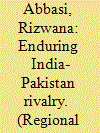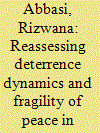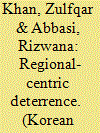| Srl | Item |
| 1 |
ID:
140927


|
|
|
| 2 |
ID:
147397


|
|
|
|
|
| Summary/Abstract |
This study reassesses conflicting strategic behavior of India and Pakistan in the changed regional environment. It predominantly focuses on evaluating the two states’ behavior in regard to their nuclear doctrines, strategies, force postures and, operational plans and their impact on deterrence stability/instability. It continues by examining the following questions: Why do these states behave distinctly on their strategic goals that make peace precarious and deterrence unstable? How far have the changing security dynamics and emerging doctrinal structures of these states made regional deterrence more or less stable? How can these states stabilize deterrence and secure regional peace? The paper finds that nuclear deterrence in South Asia apparently has stabilized the region but the peace was precariously maintained because the two states have distinct strategic direction and goals. India and Pakistan cannot avoid serious and unavoidable risks of nuclear war until they lay down their all-inclusive military plans, adopt budgetary constraints, institute an arms control mechanism and build a stable political relationship.
|
|
|
|
|
|
|
|
|
|
|
|
|
|
|
|
| 3 |
ID:
125253


|
|
|
|
|
| Publication |
2013.
|
| Summary/Abstract |
It is generally believed that a stable nuclear deterrence averts wars between nuclear adversaries, and makes peace secure. This conceptual argument has merit in terms of the prevention of all-out war; but it does not fully address the need to prevent the outbreak of a limited war between two nuclear weapon states. India and Pakistan have already fought one limited war, Kargil, in a nuclear environment. These two relatively new nuclear weapon states rely on nuclear deterrence to address the external threats. While frequently occurring conflicts demonstrate this, a recurrence of limited war cannot be ruled out in this crisis-ridden region, which would be fraught with significant dangers of escalation. Using a qualitative research approach and deploying a structural deterrence theory as a conceptual guiding tool, this paper investigates the nuclear future of the region, including the prospects of war, conflict termination strategy, escalation control, escalation dominance mechanisms, and finally suggests some pertinent lessons for crisis stability.
|
|
|
|
|
|
|
|
|
|
|
|
|
|
|
|